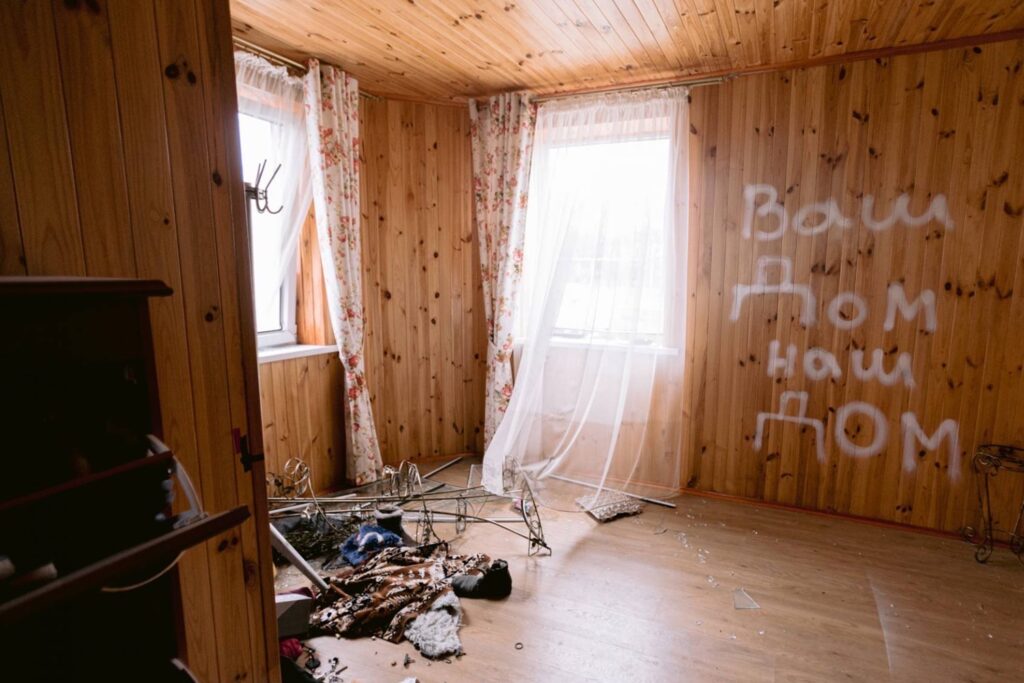WALL LIBRETTO
聲音裝置與行為藝術表演:瑪驪雅蒳 Mariana Savchenko
合作藝術家: 吳季禎
開幕活動行為表演:2月25日
展覽時間:2月25日- 3月10日
(工作室內部空間僅2/25開幕活動時開放,展覽期間參觀以室外空間為主)
開幕活動流程
12:30 開放進場
13:00 行為表演
14:30 藝術家交流會
地點:橋頭工作室
新北市八里區龍米路一段100巷23號
Google導覽地圖
https://reurl.cc/a1bvV9
淡水線關渡站>轉搭公車 紅22 紅13>關渡大橋站下車
中和新蘆線蘆洲站>轉搭公車704>關渡大橋站下車
展覽介紹:
WALL LIBRETTO 是基於「Wall Evidence」開放檔案中的資料。 借助文字轉歌曲技術,藝術家將俄羅斯軍隊在烏克蘭境內曾佔領的各個地區所留下的標記變成「唱本」。 這些「唱本」與柴可夫斯基根據普希金詩歌《波爾塔瓦》改編的歌劇《馬澤帕》的音樂交織在一起,重新創造出所謂「俄羅斯世界」所代表的意義維度。
2022年2月24日,俄羅斯全面入侵烏克蘭並佔領東部、北部和南部領土。 隨著烏克蘭軍隊解放被佔領土,我們不僅看到基輔、切爾尼希夫、赫爾松和哈爾基夫地區的平民遭受的破壞、謀殺和折磨,還看到了佔領者留下的痕跡,包括被毀壞和被掠奪的建築牆壁上的文字。
自2022年4月以來,文化機構「Mizhvukhamy」一直在烏克蘭境內收集俄羅斯軍隊的標記文字,並創造了「Wall Evidence」(牆壁證據)開放專案,隨著每個被佔領地解放後都會更新,目前包含五百多筆「資料」。這些文字的內容各不相同,有對烏克蘭人的憤世嫉俗、侵略性和輕蔑的威脅,俄羅斯和蘇聯常用的宣傳口號,對烏克蘭人的道歉,甚至包含俄軍佔領後「改造」的設施標示。
融合柴可夫斯基的歌劇《馬澤帕》與俄羅斯佔領者留下的文字,隱喻幾個世紀以來俄羅斯對烏克蘭土地的殖民統治、文化擴張、對烏克蘭民族認同的抹殺和否認、對烏克蘭人的強制壓迫、對歷史的扭曲,以及所謂「兄弟民族」的帝國沙文主義價值觀貶低烏克蘭人仍然是「小俄羅斯人」。
彼得·柴可夫斯基是俄羅斯古典音樂最知名的招牌之一,俄羅斯文化人士以這個名字保護自己遠離於普丁政權的罪行侵害。 俄羅斯聯邦全面入侵後,廢除俄羅斯文化符號以及在全球推廣烏克蘭藝術的重要性成為烏克蘭社會的熱門話題。 另一方面,頂尖的高等音樂教育機構烏克蘭國立音樂學院仍然以作曲家柴可夫斯基的名字命名,音樂學院的更名是藝術界、民間社會和政府之間持續爭論的主題。
17世紀末烏克蘭哥薩克領袖(黑特曼)伊凡·馬澤帕這個人物是透過俄羅斯歷史的觀點而廣為人知,在與瑞典帝國的大北方戰爭中,他被看作是沙皇彼得一世的叛徒,並被俄羅斯東正教開除及詛咒。 然而,對烏克蘭人來說,馬澤帕則是一位為哥薩克酋長國的利益而行事的愛國者,也是烏克蘭文化和教育的傑出贊助人。
伴隨著歌劇《馬澤帕》和俄軍入侵烏克蘭的有聲「牆壁唱本」的聲音,藝術家將進行現場表演,在自己的身體和藝術空間的玻璃牆上畫她想永遠擺脫「俄羅斯世界」所帶來的創傷痕跡。
觀眾將有機會向「台灣烏克蘭陣線」捐款,為烏克蘭捍衛者的人道主義和技術支持做出慈善貢獻。
PHOTO:
俄軍在烏克蘭居民家中題詞「你們的家是我們的家」。 基輔地區大德梅爾卡社區。
照片來源:ProSLAV。
Inscription by Russian military ‘Your home is our home’ in the home of local residents. Velykа Dymerka, Kyiv region. Photo credit: ProSLAV.
WALL LIBRETTO
Sound installation and performance by Mariana Savchenko
Guest artist: Chi Chen Wu
Performance: February 25
15:30 – opening
16:00 – performance
17:30 – artist talk
Exhibition: February 25 – March 10
Location: QiaoTou studio
No. 23, Ln. 100, Sec. 1, Longmi Rd., Bali Dist., New Taipei City
Google Map
https://reurl.cc/a1bvV9WALL LIBRETTO is based on the documented texts from the “Wall Evidence” open archive. With the help of the text-to-song technology, the artist turned the inscriptions left by the Russian army in Ukrainian settlements, into a “libretto”. The sung texts are interwoven into the music of Tchaikovsky’s opera “Mazepa” based on Pushkin’s poem “Poltava”, thus creating a new dimension of meanings carried by the “Russian world”.
On February 24, 2022, Russia launched a full-scale invasion of Ukraine, occupying territories in the East, North, and South of the country. With the liberation of the occupied territories by the Ukrainian army, we saw not only devastation, murdered and tortured civilians of Kyiv, Chernihiv, Kherson, and Kharkiv regions but also traces of the presence of the occupiers, including inscriptions on the walls in the middle of destroyed and looted settlements.
Since April 2022, the team of the cultural institution “Mizhvukhamy” has been collecting inscriptions of the Russian military on the territory of Ukraine. Their work resulted in the “Wall Evidence” project, an open archive of Russian inscriptions which is replenished with each de-occupied settlement and currently contains more than five hundred “messages”. The content of these inscriptions varies from the marking of the territory on the infrastructure captured by Russian soldiers to frankly cynical, aggressive, and contemptuous threats towards Ukrainians, numerous slogans and quotations of Russian and Soviet propaganda, as well as apologies for their actions.
The integration of the wall inscriptions of the Russian occupiers in the context of the opera “Mazepa” is a metaphorical reminder of centuries of Russian colonization of Ukrainian land, cultural expansion, erasure and denial of Ukrainian national identity, distortion of history, and imposition of imperial chauvinistic values of the so-called “brotherly nation”, for whom Ukrainians have always been “Little Russians”.
Pyotr Tchaikovsky is one of the most recognizable brands of Russian classical music, with the name of which Russian cultural figures shield themselves from the crimes of the Putin regime. After the full-scale invasion of the Russian Federation, the issue of abolishing Russian cultural symbols and the importance of highlighting Ukrainian art worldwide became acute topic in Ukrainian society. In particular, the leading institution of higher musical education, the National Music Academy of Ukraine, still bears the name of the composer Tchaikovsky, and the renaming of the conservatory is the basis for ongoing debates between the artistic community, civil society, and the authorities.
The figure of Ivan Mazepa is widely known precisely through the prism of Russian historiography, where he is interpreted as a traitor to Tsar Peter I in the Great Northern War with the Swedish Empire, and his name is still anathematized by the Russian Orthodox Church. For Ukrainians, hetman Mazepa is a patriot who acted in the interests of the Hetmanate, and an outstanding patron of Ukrainian culture and education.
Accompanied by the sounds of the opera “Mazepa” mixed with the voiced “wall libretto” of the Russian invasion of Ukraine, the artist will create a live performance, painting her own body and the glass walls of the installation art space with traumatic traces of the “Russian world”, which she wants to get rid of forever.
The audience will have the opportunity to make a charitable contribution to the humanitarian and technical support of the defenders of Ukraine by donating to Taiwan Stands With Ukraine.
